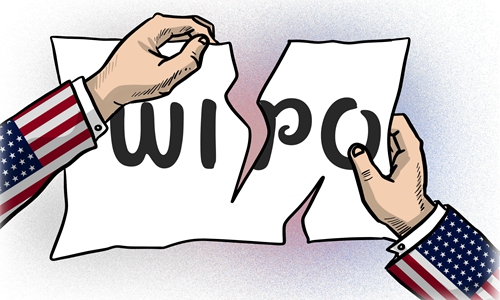HOME >> SOURCE
WIPO, world don’t need US bullying and interference
By Cong Ge Source:Global Times Published: 2020/2/26 18:55:39 Last Updated: 2020/2/26 23:36:15

Illustration: Luo Xuan/GT
Next week, the World Intellectual Property Organization (WIPO) will hold an election for its next director general. This was supposed to be a serious but standard matter handled in line with existing regulations and procedures of the agency. But the US, as it has done many times before, is seeking to interfere in the election and bend the agency's 191 other members to its political will and put its economic interests over those of others.
After China nominated Wang Binying, who has risen through the ranks to be deputy director general in her 28-year career at the agency, to be the next director general, Washington apparently became paranoid and launched an extensive campaign against Wang's nomination.
Peter Navarro, the anti-China trade advisor at the White House, wrote a piece for the Financial Times, urging that the US not "give China control" of the WIPO. There are so many things wrong with this assertion. For starters, a senior US official is openly calling for the US government to blatantly interfere with the election. Second, it billed the US as the ultimate authority over the WIPO that could "give" the leadership to others. Third, it suggested whoever holds the director general position means his or her country will take "control" over the agency.
We hope all WIPO member states and the entire world will recognize the seriousness of such claims and their potentially irreparable damage to the integrity of the election process for the WIPO's director general, to the reputation and fundamental values of the multilateral agency, and to its work to promote the protection of intellectual property rights (IPRs) around the world.
Now, if there were any questions or doubts about Wang's professional qualifications, any member state, the US included, should be allowed and even encouraged to raise them during the election. However, what Washington is targeting is not her expertise, professionalism or work ethic but her country of origin. If that's not the definition of discrimination, we don't know what is.
The US knows very well that it cannot lie about Wang's character and professionalism because those at the WIPO and from member states would realize it. Wang, who has received multiple degrees from prestigious universities in China and the US, has held a wide variety of positions at the WIPO, including the deputy director general's position since 2009 and the assistant director general's position before that. She is a highly regarded expert in the field by her peers in China and abroad.
So Navarro and others who have also been targeting Wang's nomination resorted to their baseless accusations against China's own efforts to protect IPR. China is an easy target because of the challenges it faced over the years to enhance IPR protection, like many developing countries that still face the same challenges. But in just around four decades, China built a system that is up to international standards. China is now a leading force in global innovation.
That brings us to the ulterior motives behind the US campaign against Wang's nomination: preserving its fading dominance in trade and technology through political gambits. The US has waged trade wars with not just China but also major economies in Europe and beyond. The US has also put up barriers to disrupt global cooperation in technology.
Let's not forget, the US sought to cripple the WTO and even threatened to withdraw from other global multilateral bodies if they do not serve the US' economic interests over all the others. In the case of the WIPO director general election, the US also threatened to stop aid if others supported Wang's nomination.
If the world sits idle and allows the US to continue such bullying and disruptions to the world trade and technology governance mechanism, the repercussions will be felt by not just China but the entire world, particularly developing economies. Allowing such behavior would let the US push for more unfair trade practices only in favor of its own economic interests. We hope the world will stand up and stop the US once and for all, starting with the WIPO election next week.
The author is a reporter with the Global Times. bizopinion@globaltimes.com.cn
Posted in: COLUMNISTS